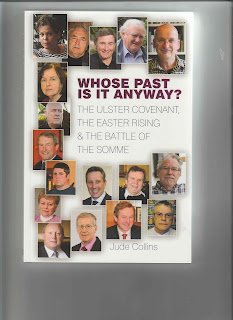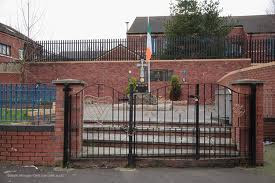To get to Ciaran Mackel’s office, I have to climb narrow stairs past a barber’s emporium, another flight up to spacious, well-lit rooms, with pictures of houses and plans for houses on the wall. The man himself when he joins me has something of the – no, not zealot- artist is maybe a better word. This lean, grey-haired 50-something nurses an inner fire.
When he was sixteen, he faced three roads. He was involved with the Irish language and thought about becoming an Irish teacher. He was into drawing and graphic design and could have turned his hand to that. In the end he opted to become an architect. Maybe not all that surprising, since his father was an architect before him.
“He was the architect on the housing at Shaw’s Road, helped get the first bunscoile off the ground and was involved in the rebuilding of Bombay Street. He had a habit of working most nights at home, so he would have come home and take a drawing table out of a cupboard somewhere and put it up on the dining table and propped it up with a few bricks and draw at it. So that act of drawing and the sense that drawing was part of a broader activity helped convince me that that’s what I should be doing. Even earlier, in the later years of primary school, we’d have been asked to go down and draw in town, so I’d have walked down the Falls and drawn some particular streets and their activities.”
Then there’s that inner burning thing again.
“I feel very passionately that architecture’s not just a job, it’s a vocation. You’ve got to feel committed to it: what you’re doing is more than a project you must do. Architecture is definitely not 9 to 5. That to me was never the case. Even if you were to try and fall asleep, you’re thinking ‘How will this bit work?’ and ‘What will I do if that bit doesn’t work properly?’ Then you wake up the next morning and start to draw, and you realise dreams and half-dreams aren’t solutions.”
He feels that to be given an architectural project to work on is to some extent a privilege. “Some person trusts you, whether it’s £5,000 or £100,000 or £1,000,000, they trust you to do it right. So it’s fairly important - a fairly moral position to be in. So it can’t be a 9 to 5 thing. Your responsibility is not just to that client and their property but it’s also to the broader public, because people have to look at what you’ve built, and for a long period of time”.
I ask him what’s the difference between an ugly building and a beautiful building?
“There’s a difference between building and architecture. Building is someone saying ‘I want you to do this because it has a functional outcome’. Factories are a bit like that, or simple sheds or garages. And some people’s houses are a bit like that. On the other hand if you do a house for someone that sees the house as their home or retreat, and they want something more than the straightforward output – that’s where beauty comes in.”
So I ask him about the billboards that advertise Luxurious Georgian-style Houses and the like. Does building in the style of the time of George the Whatever make sense to him?
“No it doesn’t make any sense to me. It’s not really Georgian-style anyway – it’s some sort of pastiche. It never meets Georgian proportions, for one. Georgian proportions were beautiful. Georgian streets in Dublin are beautiful.”
People want these sort of bastard-Georgian houses (that’s my word, not his, in case you were worrying) because it gives them some sort of nostalgia, he thinks. But it doesn’t make sense. He speaks of people who drive up-to-the-minute cars, dress in contemporary clothes – yet want to live in Georgian-style houses. It baffles him. “You go into one of these houses, it feels odd and entirely wrong”.
He was involved in the early stages of the extension of the Culturlann on the Falls Road. I ask him about the difficulty of marrying the old of the nineteenth-century Presbyterian Church that is the Culturlann with the unabashedly modern extension.
“It’s not a particularly beautiful church but it’s there, and it says something about its history and its place, and about the changing community shape and profile. The church was, I think, butchered by an intervention in the early nineties”.
How does he mean, butchered?
“They had a building that was tall, big volume – no use. So they put in a few floors, with staircase at either end, and it allowed multiple activities in the building. Because the floors were concrete, it was difficult to get back, to restore some sense of volume, what the building would have been like.”
By volume, he tells me, he means the sense of space and height you get, walking into a church. All that was lost with the butchering.
“My intention was that the Culturlann should claim its place with a simple glass wall that says ‘We’re proud enough to be out here on the street and we’re confident enough that this is a glass wall, the thinnest possible glass wall between the activity and the identity of the culturlann and the activity of the street' ”.
Architects aren’t good at talking about their work or engaging in dialogue with the public about what they do, he thinks. You'd never guess that, talking to him.
He was involved with the Andersonstown News building as well. They modelled some aspects of it on a building in the Pompidou Centre in Paris. Part of his intention in designing the building was that “the public would walk in the door, would go to the reception desk and could see the door that leads into the offices, could see through the door that leads into the printing presses. The theory was that what they saw was their story being picked by somebody, transferred to a journalist, transferred by line of sight to the printing press, and then as they walk out the door, the van that takes the story for distribution passes them on the driveway”.
He talks about ‘sick buildings’. An example he gives is of a university building where the window can’t be opened, other than by computer. But people feel the need of air when they want it, not when some computer decides.
He talks about ‘modular build classrooms’ he’s been involved with. New thinking about how one should teach means that new thinking about the shape of such classrooms emerges.
“You want to create a space for maybe story-telling, or a space where children might paint or draw. So there’d be a series of alcoves or places that might make that space seem particular”.
OK - time to get blunt. Isn’t Prince Charles very into retro architecture?
“He is, big time, and I think that’s dangerous. That’s maybe fifteen years ago. I think what he was doing then was what British royalty has always done: to be invited somewhere and then abuse the people who invited you. Unfortunately, architects didn’t challenge what he said. They should have said ‘Back off, or else let’s have a proper debate here’.”
At one point in Belfast, he feels, we were so desperate for investment, “anybody coming in was welcome to build anything”. But he feels that people coming in now are more open to debate about what gets built.
There’s always a debate about what you keep and what you don’t keep. After all, Belfast probably demolished lots of Georgian architecture to replace it with Victorian. In which case, what’s his favourite Belfast public building?
“I always liked Transport House, although it does look tired and needs something done to it now. But I always liked the notion that it stood at the end of High Street, that it was a contemporary modern building done in the 1950s, I think, using tile - didn’t have to copy the brick next door to it . It had a simple glass entrance, it had the mural piece that said something about public art, but wasn’t the grand statue of a soldier or some bloody aristocracy person, but was celebrating ordinary endeavour.” He also likes the Ashby Building up by Queen’s. “It stands as a strong, bold contemporary building, surrounded by two-storey houses. And I think the new Lyric is quite a beautiful building “.
And ugly buildings?
“I never really liked City Hall. It’s the pompous nature of it, in some way – and I suppose Stormont has the same sort of notion, for me. It stands on a hill, this bold thing. I just feel both buildings are too pompous and overblown – too rich for my plain tastes. And I do not like the new Titanic signature building – I think it’s an awful waste of opportunity. Why take the photograph of a ship’s hull and replicate that four or five times in the building? It makes no sense really. The other thing which I think is a big mistake: why would anyone want to go to stand on a staircase that replicates a staircase that was on a ship ? I really don’t fathom that. I said at a meeting one night that some of the conference rooms in the Titanic building remind me of the interior setting of a Donegal hotel. And this woman said “ How dare you – I’m from Donegal!” Well you know, I love Donegal too, but that doesn’t mean you have to do this sort of overblown affair. Compared to buildings elsewhere – well…”
And he talks enthuiastically of a building south of Madrid he saw recently, and how the building is both beautiful and is responsive to the needs of those using it. How its lattice-work allows the strong Madrid sunlight to kind of dance across the room. “And that building was done for probably half what the Titanic building cost. That’s about an architect using the fullest resources rather than making simplistic gestures”. He pauses and laughs. “I hope I’m not being overly critical!”
I end by reminding him that he once said “Architecture is an art form that must respect the community.” What did he mean by that?
“If you go for a walk in a forest and your path takes you to a clearing in the forest somewhere. And in this clearing in the forest you notice this kind of mound of earth that is about six feet by three feet and slightly raised. Something in you stops and says ‘There’s someone buried here’. That sense or that feeling is what architecture is trying to get to. I feel architecture should bring something more than just the functional part of any project. It should be trying to enrich people, or give something more – add in things that the client doesn’t have to pay for. It’s about saying ‘By doing this simple thing, it will enrich your living.or your quality of life. Not by looking at it, but using it. Or we think it will – it doesn’t always, of course.”
The man burns with ideas. Who was it said “Find a job you love and you’ll never work a day in your life”? He could have been thinking of Ciaran Mackel.

















